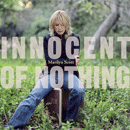 Marilyn Scott has commented that she sings about the things
that matter to her and what is going on around her personally
and politically. Over the years she has delivered a series
of CDs that balanced insights on love and life with political
awareness and social consciousness, all in musical settings
that were catchy, melodic and underscored by virtuoso performances
and striking arrangements. That being said, she's outdone
herself with this one. Lyrically, Innocent of
Nothing captures the essence of trying to navigate
the times we live in with a sense of integrity. Musically
it is exactly what you would expect when some of the most
respected musicians in contemporary jazz get to play without
boundaries. It is original, innovative and full of breathtaking
nuances. Marilyn Scott has commented that she sings about the things
that matter to her and what is going on around her personally
and politically. Over the years she has delivered a series
of CDs that balanced insights on love and life with political
awareness and social consciousness, all in musical settings
that were catchy, melodic and underscored by virtuoso performances
and striking arrangements. That being said, she's outdone
herself with this one. Lyrically, Innocent of
Nothing captures the essence of trying to navigate
the times we live in with a sense of integrity. Musically
it is exactly what you would expect when some of the most
respected musicians in contemporary jazz get to play without
boundaries. It is original, innovative and full of breathtaking
nuances.
Innocent of Nothing reunites
Scott with an impressive lineup of long-time collaborators
including Russell Ferrante (keyboards) and Jimmy Haslip
(bass) from the Yellowjackets, producer George Duke, Renando
Neto and Patrice Rushen also on keyboards, guitarist Ray
Fuller, Brian Bromberg on bass, percussionist Lenny Castro
and drummer Vinnie Colaiuta. It's impossible to list
every exceptional instrumental passage or solo on this
CD; there are too many of them. You just have to put on
headphones, turn it up, and let them unfold. Scott co-wrote
seven of the ten songs. She also covers two standards and
gives us a reinvention of a Bob Dylan classic that is completely
out of left field.
The opener, "Round and Round," is brilliant. It's
the soundtrack of our lives: a song about the hectic pace
of everyday life built around Russ Ferrante's circular keyboard
passage that seems to become more frantic as the song progresses. Scott
sings "I must keep up this pace. This is the life
I face." "Icebox" has an angular, edgy guitar/drum
riff that sounds like it came from one of those great 70s
fusion/funk albums. "Moods" is poetry set to music
segueing into music set to poetry as the song wraps up with
a recitation by Spoken Word artist/L.A. Poetry Slam Champion
Steve Connell over jazzy instrumentation. "Share It," with
its deceptively gentle groove, is about the search for romance
with substance and ends with Scott doing an excellent job
on her own spoken word piece. "The Wilderness," also
co-written with Ferrante, could complete a song cycle that
started with Full Swing's version of Ferrante‘s "Ballad
of the Whale." It's a haunting ballad about an urban
dweller from the future who has only experienced nature in
magazine pictures and museums and our responsibility for
making sure this doesn't turn into a true story. "A
Flame" is one of those great jazzy pop songs that Duke
and Scott do so well. If there was still a place for authentic
smooth jazz vocals in the radio format this one would be
as successful as "Starting to Fall" and "I'm
Calling You" were. The best way to describe her interpretation
of Dylan's "It's All Right Ma (I'm Only Bleeding)" is
that by totally changing the setting, but remaining true
to the intent of the song, she showed that it is a contemporary
masterpiece, not just an artifact from another era. There
is so much on this project that is adventurous and risky
compared to the majority of recent releases by NAC/Smooth
Jazz vocalists, but because of the way the songs are sequenced
and the musicality of it all it isn’t overwhelming
or challenging to listen to.
The wonderful thing about Scott is that her vocals draw you
into the material instead of drawing attention to how she
is singing it. She can sing with deep emotion without over
dramatization and she doesn't over-sing. She has a gift for
knowing exactly how much is needed to put the song across
and give the person listening a chance to connect with it.
This really shows on her interpretations of standards. Her
version of "Round Midnight" is emotionally charged,
you can feel that nervy feeling that comes late at night
when you've been through a breakup. "Spring Can
Really Hang You Up The Most" is more subtle. There's
this sense of inertia, of being hung up. Maybe the ability
to be an interpreter does come with maturity. Maybe living
the story does give it more meaning in the telling. The freshness
and naiveté of youth have their place, but it’s
overrated. Growth and experience are what brings an artist
to the point where they can release a gutsy, innovative album
and trust that there are listeners out there who will hear
to it, love it, and "get it!"
- Shannon West
|

